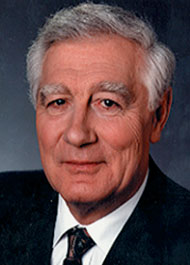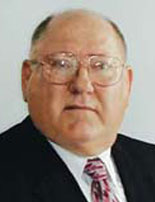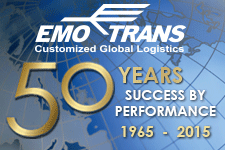
1990.
Joseph Le Louarn, regional director of customs
at Roissy, France, addressing
a Manhattan audience of international traders,
advised American shippers to his country to lend
speed to the transmission of information concerning
the movement in order to free all or part of the
shipment as soon as it is unloaded at Paris’
Charles De Gaulle Airport. The official added:
“If a consolidator can send by fax a copy
of the master or house air waybill along with
references which can be agreed upon at the start
of the procedure, then there is surely some work
we could do together. This is assuming there is
a good working relationship among the U.S. consolidator,
his representative in Paris, the airline, and
customs authority. I am prepared to try anything
toward this end.”
 2001.
Pierre J. Jeanniot, director general, International
Air transport Association,
said “We have an airline industry which
is still overfragmented and which is forced to
operate with a largely government-owned infrastructure
which has yet to liberalize and which threatens
to strangle our growth… on the subject of
globalization, although it may be fair to say
that bilateral and ownership rules have provided
some originally needed protection to national
airlines, giving them time to adjust to market
forces, it is my belief that those same rules
are today restricting the ability of airlines
to become truly international corporate entities.” 2001.
Pierre J. Jeanniot, director general, International
Air transport Association,
said “We have an airline industry which
is still overfragmented and which is forced to
operate with a largely government-owned infrastructure
which has yet to liberalize and which threatens
to strangle our growth… on the subject of
globalization, although it may be fair to say
that bilateral and ownership rules have provided
some originally needed protection to national
airlines, giving them time to adjust to market
forces, it is my belief that those same rules
are today restricting the ability of airlines
to become truly international corporate entities.”
 2006.
Kenneth M. "Joe" Fralick, vice president-Cargo
World Airways, was quotes on his
reaction to the “present-day traffic/distribution/logistics
professionals” who are described as “highly
practiced managers who understand and partake
of a menu or increased shipping options…
these modern pros, especially the ones at the
big, multinational producers, are impressively
versatile but a good deal more demanding.” 2006.
Kenneth M. "Joe" Fralick, vice president-Cargo
World Airways, was quotes on his
reaction to the “present-day traffic/distribution/logistics
professionals” who are described as “highly
practiced managers who understand and partake
of a menu or increased shipping options…
these modern pros, especially the ones at the
big, multinational producers, are impressively
versatile but a good deal more demanding.”
1998.
Richard Brannon, American Airlines’ managing
director – Cargo Alliances and Industry
Affairs, responding to a query
in an interview, candidly expressed admiration
for the integrators’ achievements, underscoring
“refining the service element to a high
degree.” Brannon himself flatly stated:
“Our competition is the integrator. We have
to match the integrators’ services. We have
to provide service levels that are comparable
to theirs”—possibly a five-year task.
He added: “When that time arrives, the forwarders
will be able to make real choices between the
integrators and the airlines.” |



